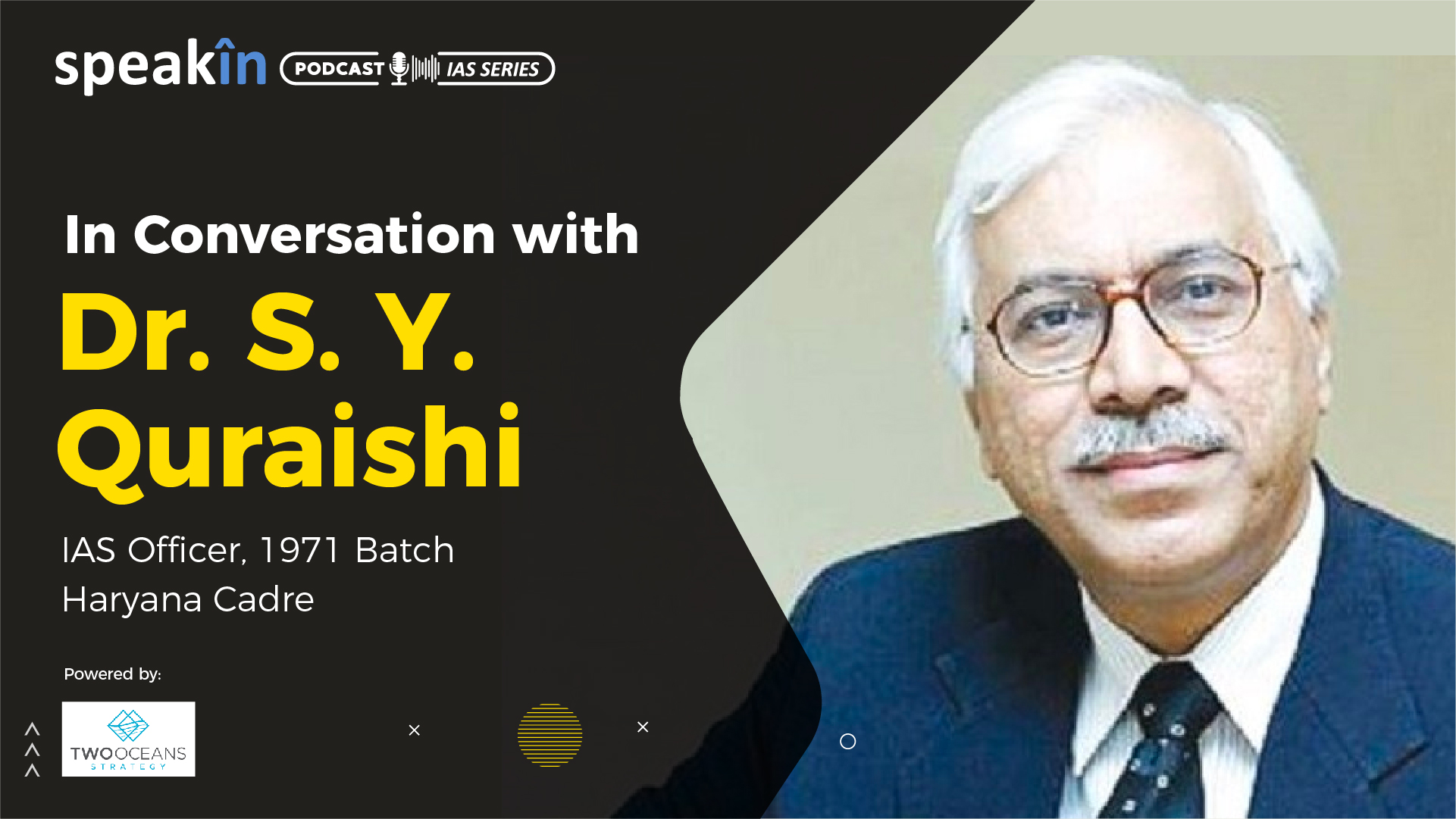Born in the year of India’s independence, Dr. S. Y. Quraishi was one of India’s most distinguished civil servants. He joined the Indian Administrative Service in 1971 and held several key positions throughout his career, culminating in a famous tenure as India’s Chief Election Commissioner.
Dr. Quraishi is well known in India and abroad as a development thinker and for his inclusive style of leadership. He is highly regarded for bringing together diverse groups and institutions for achieving development goals.
Excerpts from an interview with SpeakIn:
You have had a long and distinguished career in the IAS, if I could just ask you to look back on your 35 and more years in service, how would you describe your innings as a public servant?
I think it is the best career for young people in India. The variety of experience that you get through those three or four four decades of service is hard to match. There used to be a debate right from the ICS days of the British days and it was a considered decision then that we should have generalists manning the civil services. Specialists know more about less—kind of a tunnel vision. They have in-depth knowledge about fewer things whereas someone from the humanities sphere has a broad perspective on life. There was great wisdom in that line of thinking, until much later when the service opened to doctors and engineers.
Talking about myself, I was a student of history, English literature and political science. But, remember, during our probation at the academy we get two years of professional training in public administration, which makes us experts too. We may be generalists in terms of subjects but we are specialists in public administration. I could be agriculture secretary today, director of science and technology tomorrow, then the IT secretary. Now, I am not an agricultural scientist, or an IT expert, but I have domain experts to assist us. IAS officers should realise that their job is to provide leadership, manpower management and for the expertise we depend on specialists.
Many of the IAS officers think that their collector/ DM days are the best part of their careers. Do you think that they lose their connect with grassroots levels as they rise in hierarchy and go into policy making position.
My philosophy is after three years remaining a DM is a waste of time because you are doing the same job again and again. It also spoils you because in a district a DM is treated as a demi-God, it can go to your head. That grassroots experience at the start of your career stands you in good stead as you go up the hierarchy in the bureaucracy and don policy making roles. Besides, even as you reach the higher echelons of the bureaucracy, your connect with the grassroots level comes indirectly through younger officers and collectors. In my case, I always had that immediate connect because I was Joint Secretary, Youth Affairs, in addition to that I was also the Director General of the Nehru Yuva Kendra Sangathan and we had a 300,000 strong youth club with us. For me the entire country was like a collectorate. I was travelling all over the country to the remotest places. That variety of exposure was unique.
The exposure you have as a civil servant is wide and varied generally, in your case specifically it was quite remarkably so. . .
Yes, indeed, and that is why I have more than enough reason to look back satisfactorily as my civil services career. I had quite a variety of postings. When I was the power secretary in Haryana, Mr Bansi Lal, then the state chief minister, had promised to the people of Haryana that he would provide 24-hour electricity supply. He gave me the responsibility to do bring in power reforms, including unbundling of the Haryana Electricity Board into four different companies: transmission, generation and two different distribution companies. This was eventually passed as a bill in the Vidhan Sabha. It was a World Bank-assisted project involving negotiating with the Bank for $600 million. Setting up of a regulatory commission for which we had choose a commissioner. It was a great experience through which I learnt various things. Later, I was Principal Secretary of Mr Om Prakash Chautala. I was dealing with just about everybody and you need an overview of the state. That was gratifying. Later on, I became Director General of Doordarshan, which was a memorable experience. And finally Election Commissioner.
Earlier the IAS was a career most young people aspired to. But, of course times have changed and a corporate career today is certainly hugely attractive. What’s your assessment of where the Indian Administrative Service stands today? Is it still a desirable career for young people?
Personally, if I could go through life again and faced a career choice, I would choose the IAS all over again. Maybe because I have had such an enriching experience. But, I would concede that the service perhaps doesn’t attract the same talent that it used to. Now the best pool of talent goes to multi-national companies because of the remuneration they offer. They can pick you top from the campus at a remuneration that is more than what you would get after thirty years in the IAS when you could be Cabinet Secretary. It would be correct to assume that the best young talent goes to those jobs. However, look at the selection process to get into the civil services—it remains fiercely competitive; every year about a million candidates apply for 500 jobs is quite something. Eventually across the civil services 800 to a 1,000 aspirants make it. So, it’s fair to say that the service does attract some of the best talent available.
How does a civil servant maintain political neutrality?
This is something that is taught to all new entrants from Day One at the academy. What I would say, drawing on my experience, is that a civil servant should realise that his or her role is to do the job and it’s not some kind of a popularity race with the politician. Even if a civil servant has a particularly bright idea, why not tell the people that it was actually the MLAs idea? That way your idea gets implemented and flourishes and the politician is happy too.
My own experience is that 90 per cent of the time there is no clash between a politician and a civil servant. I used to take the politician into confidence, tell them about my plan and say I need your support. And I would give them the credit. That kind of a bargain usually works and it’s a win-win for both sides.
But young people temperamentally want to be given all the credit for their ideas and creativity. How then do you convince young people that working as a civil servant—nameless and faceless—is all right?
That’s a matter of the outlook that young people have on the profession. If that is what you are looking for then maybe IAS is not for you. You learn about the strengths of a civil servant’s role from those who have done it successfully and creditably. So, you learn from senior. There are those who sort of fail the Civil Services exam a few times and finally succeed and feel that they have arrived and they are now God. That’s the wrong attitude. The thing that stands out about this profession is public service; you want to positively impact the lives of the common people. At the academy we have some courses designed especially to teach them this.
To return to the generalist vs specialist argument, doesn’t a civil servant sound like a jack of all trades?
Yes, but you need a jack, because masters you have in terms of subject matter experts. So, a civil servant as a jack of all trades is good. It is in fact an advantage because there’s an open-mindedness that comes with it. You have to be open to ideas.
I am not saying that specialists are not good. They are but their vision can at times be narrow, and in the IAS you need a broader vision.
Just to give you an example: I was the Chief Administrator of the Haryana Pavilion at the India International Trade Fair. There was an IAS officer, from an engineering background, who was my deputy. We had hired an artist named Naresh Kapuria to design the Haryana pavilion. Naresh was working at that time at Triveni Kala Sangam (TKS) as a clerk, but the director of TKS suggested I ask him to design the pavilion. She said he’s very creative and he will do wonders. I had great regard for the lady and I went by her advice and hired Mr. Kapuria. That was unusual.
The previous year the pavilion had been designed by M.F. Husain, mind you. And I was now hiring a clerk. But one day in the middle of the assignment he came to me quite upset and complained that my deputy was measuring his work as a carpenter, not an artist. I spoke to my young colleague about this and asked him to change his attitude. I am happy to say he did abide by may advice and we went on to get is the best pavilion award that year. This is perhaps is an example of the value of a broad vision.
Besides, as civil servants we are trained extensively. We may be generalists but we are also experts in public administration. An MBA can head any company. Likewise, so too can an IAS officer. Heading a company means HR management, financial management, coordinating and dealing with politicians and the government—all these are skills that a civil servant is taught.

